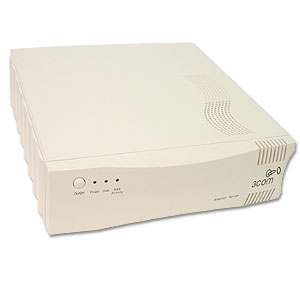
Hacking The 3Com
Multi-Purpose Internet Server
Christopher Rath
May–June, 2002
|
C A U T I O N Most of the actions I describe herein result in the voiding of the device’s warrantee. I take no responsibility for any damage which might result from anyone attempting to duplicate my work. In other words, you bear all responsibility for your own actions. If you break your 3C19504 then it’s your own fault. I do not recommend you reproduce my work! This information is offered for entertainment purposes only, no warrantee is offered or implied. |
The 3Com Multi-Purpose Internet Server (Model 3C19504) is a discontinued Linux-based Internet appliance. It provides the following functions: web server, firewall Remote Access Server (RAS), web cache, email server, file server, FTP server, print server, and DHCP server.
As of May, 2002, Computer Geeks is liquidating 3C19504’s for $199US (note, they
sold out of units in only a few weeks). I consider this a bargain, and so I purchased one with the
intent of upgrading its internal hard drive and customizing it to suit me. Since it is
Linux-based, I figured that I had better than even odds of success in this endeavour. This
web-page documents my experiences hacking my 3C19504.
3Com’s Internet Server product links:
 The 3C19504 is actually
a stripped down PC; specifically, it’s a First International
Computer America Inc. (FIC) Sahara 1000
with a 500 MHZ Celeron processor and 32 megs of RAM. 3Com has had all unnecessary
components removed from the motherboard (i.e., the parts were never soldered onto the boards in
the first place), and so only the hardware necessary to deliver the 3C19504’s services are in
place. This means that there is no floppy drive, no connector to plug a floppy drive into, no
sound card chips, etc.
The 3C19504 is actually
a stripped down PC; specifically, it’s a First International
Computer America Inc. (FIC) Sahara 1000
with a 500 MHZ Celeron processor and 32 megs of RAM. 3Com has had all unnecessary
components removed from the motherboard (i.e., the parts were never soldered onto the boards in
the first place), and so only the hardware necessary to deliver the 3C19504’s services are in
place. This means that there is no floppy drive, no connector to plug a floppy drive into, no
sound card chips, etc.
Of more relevant interest to me, the hacker, is what 3Com left behind; i.e., what hardware did I buy? In place are:
If you crack the case open, you’ll see inside:
So far, here’s a summary of what I’ve managed to learn:
Rather than make this page enormously long, I have broken out my investigation log, detailed problem listings, and details on how to make the device functional into their own pages:
These links have been helpful in my hacking of the 3C19504: